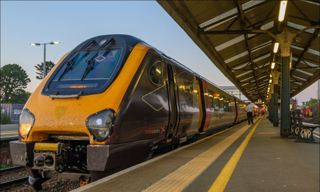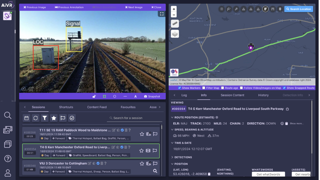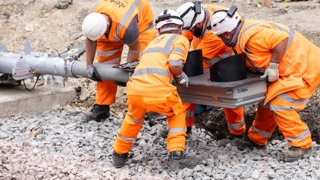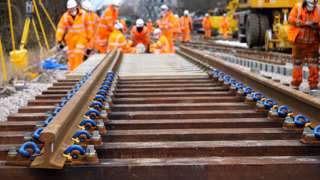The railway is only as strong as the people who work on it. Nowhere is that more painfully clear than on Govia Thameslink Railway’s network, where the industry is achieving the singular feat of shooting itself in the foot at the same time as kicking itself up the backside.
On one side the franchise owner wants to change the role of on-board staff and make all its trains Driver Only Operation, meaning that although there are on-board staff, the driver controls the doors. This already happens on around 60% of its 3,200 daily services, so the man on the Clapham omnibus would rightly puzzle why this is even an issue.
On the other side unions are resistant to this. Many members are taking industrial action, either outright strikes or refusing to work overtime and rest days. This highlights how much the railway relies on goodwill among staff, and how much passengers can suffer from well-organised, motivated and legal action by unions who believe in their cause.
GTR’s owning group announced on June 14 that its predicted margins for the franchise have halved. Go-Ahead Group expects its margins to be 1.5%, which it says is because of the recent industrial action and the subsequent impact on service. GTR is now routinely cancelling trains, and passengers’ lives are being routinely thrown into chaos.
Already 31 trains per day are pre-cancelled, but hundreds more are cancelled on the scheduled day of operation, including one on Monday June 13 on which the Prime Minister was travelling. Can it be any more embarrassing or damaging?
Passengers simply do not care who opens and closes the doors, and are baffled by the arguments. They rely on the railways, they pay their annual season tickets, and they are being royally messed around. Their mood, understandably, is getting very ugly.
GTR is run under a management contract, which means ticket revenues are passed directly to Government with GTR paid a management fee. RMT General Secretary Mick Cash has been scathing about GTR, angrily (and in increasingly intemperate language) accusing the company of running a failing service and getting away with it following a revised franchise deal with the Government.
He claims GTR is allowed to increase cancellations by a third to 32,000 over the year, under new contracts agreed with Government, and describes the situation as a national disgrace. GTR has countered by stating the remedial plan contains targets that have been adjusted after the capability of the network (around London Bridge and the Thameslink Programme) changed.
Don’t imagine that GTR is innocent. It released figures showing an apparent increase in sickness of on-board staff, and has been adamant that the changes it proposes to the role of conductors will go ahead.
Much like the Brexit and Remain camps in the EU Referendum, information is released from both camps and then filtered and broadcast through social media. Wading through it is complicated. For instance, the RMT claims to have found disparities in Southern’s Tweets - one relates to the 0710 Brighton-Lewes on June 1, which Southern says was cancelled due to a shortage of crews, but RMT claims that a driver and guard arrived “in good time”. RMT also claims that a Southern response on May 20 about the cancellation of the 1646 London Bridge-Tattenham Corner suggested that this was because of a conductor shortage. But there are no conductors on that route, the union says.
Then on June 6, Southern tweeted that services had been “short formed due to a shortage of train crew”. Its next Tweet stated: “With longer units drivers are unable to see the full length of the train and are unable to dispatch safely.”
GTR quickly clarified this by stating that the Tweet was wrong: “The social media team has dealt with 20,000 tweets in the past week alone and a mistake was made. Both trains ran with fewer carriages than normal because, on this occasion, we did not have drivers available to bring in extra carriages to make them longer.”
Confusing? You bet - even to us. The passenger who just wants to get to work, or get home before the child minder’s late collection penalties kick in (again) stands no chance.
Bear in mind that not all the delays on the route are down to industrial relations. Network Rail has been heavily criticised in the past for its performance, and the infrastructure on this vital part of the network requires upgrading. The £6 billion Thameslink programme upgrades the central section through London and rebuilds London Bridge station, increasing capacity from eight trains per hour in 2008 to 24 in 2018, but these trains need to find capacity on the Brighton Main Line - and that capacity has still to be determined.
For such an important project it was odd there was no ministerial presence on May 24, when the Department for Transport’s Class 700 fleet was launched. Why wasn’t the Government represented at this important landmark? I’ve wearily lost count of how many times we hear about this “£38 billion upgrade” quoted in press releases - yes, it’s welcome and decades overdue, but the railway’s leaders should also be there to answer to the public when things go wrong.
This debate is not going to go away. The RMT is vocal against DOO, as are a lot of drivers I know. But all of this breeds uncertainty at a time the industry can ill afford for this to happen. With NR’s debt on the national books and the need for infrastructure upgrades to boost capacity, as well as the need for new trains, money is running short. Infuriating passengers who don’t have a choice isn’t the wisest move.
There will be uncertainty among staff who thought they had a solid career. And there will be uncertainty among investors and bidders who can’t be sure how the industrial relations and economic landscape will change. Can they be relied on to enter the industry if profit margins are a meagre 1.5%?
If all this uncertainty reduces profit margins to the sort of level GTR is talking about, will the private sector really want to invest in rail franchises? If they don’t, the only way the railway will get the investment needed will be through higher fares, which will stifle growth. Given that the unions’ members have benefitted massively from privatisation, it is hard to imagine how they would continue to prosper in the face of potentially declining passenger numbers as fare increases bite. Operators, staff and passengers could all lose out unless an agreement is reached… and soon.
So surely it is time that unions, staff and operators should be pulling in the same direction, to make a compelling case for themselves and the industry? Ultimately their profits, roles and even their jobs depend on putting the passenger first. If passengers vote with their feet during industrial action, the rail industry could be in very real trouble.
- Nigel Harris will be back next issue.
Comment: RAIL 803: June 22 2016 - July 5 2016















Login to comment
Comments
No comments have been made yet.